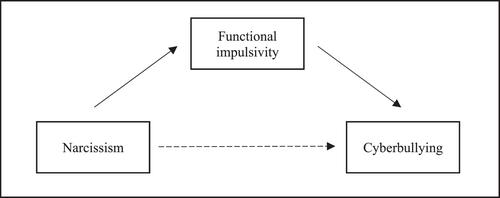Functional and dysfunctional impulsivity mediates the relationships between ‘Dark Triad’ traits and cyberbullying perpetration
Abstract
Background
Cyberbullying perpetration and victimisation have been associated with psychological distress, including depression and suicidal ideation. Prior studies have shown that the ‘Dark Triad’ personality traits (narcissism, Machiavellianism, and psychopathy) are associated with greater likelihood of perpetration, yet there is a research gap regarding potential mediators of this relationship.
Aims
To test whether functional and dysfunctional impulsivity act as mediators between Dark Triad traits and cyberbullying perpetration.
Methods
A cross-sectional online study was conducted, in which a sample of 141 university students (63% male) from Malaysia were recruited by online and local poster advertising inviting them to complete a questionnaire containing a series of psychometric scales, including measures of ‘Dark Triad’ personality traits, impulsivity and cyberbullying perpetration.
Results
A relationship between cyberbullying perpetration and higher psychopathy scale scores was mediated by dysfunctional, but not functional, impulsivity. The relationship between cyberbullying and narcissism scores was not mediated by impulsivity. Higher Machiavellianism scores were similarly associated with cyberbullying, but there was no correlation at all between Machiavellianism and impulsivity scores.
Conclusion
Our findings add to the literature by showing that not only Dark Triad scale scores are associated with cyberbullying, but that difficulty in refraining from or controlling impulsive behaviours (dysfunctional impulsivity) may be a key component in this relationship. Given that our sample was of generally well-functioning people, our findings may not extend to those with serious cyberbullying problems. Yet, they provide avenues for identifying people at risk of such behaviours before problems become well-established and call for more nuanced approaches towards understanding and intervening with problematic cyberbullying.


 求助内容:
求助内容: 应助结果提醒方式:
应助结果提醒方式:


